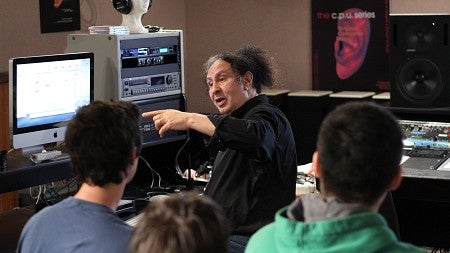
Music Technology at the University of Oregon’s School of Music and Dance has launched a new PhD program, headed by Professor Dr. Jeffrey Stolet.
The PhD in Data-driven Music Performance & Composition is a new version of the existing DMA in Performance of Data-driven Instruments. This enhanced curriculum, however, focuses more on data science and the broader study of data. The new degree, which developed from deep conversations Stolet had with other Music Technology faculty, strives to explore and understand how data and sound are connected. “The degree is a response to the rise in the importance of data in our lives,” Dr. Stolet says. “Using data and controlling the flow of data is the blood flow of what is happening artistically and musically right now. Studying data through music is not only inspiring, but also reflects data as it exists in broader society and across cultures.”
The degree includes a portfolio of six data-driven compositions, one solo recital, and the completion of 84 graduate-level classes, such as:
- Data Sonification
- Twentieth Century Music
- Oregon Electronic Device Orchestra (OEDO)
- Data-driven Instrument Performance
- History of Electroacoustic Music
- Computer Music Composition
- Musical Performance Networks
- SensorMusik
In the Music Performance Networks course, for example, students connect computing devices to form a constellation of digital instruments to compose and perform music, as demonstrated in Stolet’s performance titled, “ImPossible.”
Stolet explains that instead of exerting energy into a physical body like pressing a piano key, plucking a violin string, or striking a drum, you can create data streams that control sound by operating and interface device. “For example, I can turn a phone left and right and based on how I turn it, data is output, and that data may be sent through the air wirelessly to sound-producing algorithms that will respond to the data and produce the sounds that are desired.” In the Networks and OEDO classes, many of these data-driven instruments are connected to form a community of digital instruments. Stolet demonstrates in the video below.
In data sonification classes, data sets are articulated through musical parameters contained in sound-producing algorithms for the purpose of articulating features in the data. Whereas some data is better articulated through visual mediums like pie charts, other data is better articulated with sound. “Any time you try to articulate things that unfold over time with something that doesn’t unfold over time you have this incongruity, and the data can be distorted,” Stolet explains. “For example, NASA does a lot of sonification because it allows a lot of data sets to be articulated simultaneously over time.”
Following the PhD program, career options range from academia to jobs in artificial intelligence and data science. Since SOMD started its music technology programs, graduates have worked for Apple and other tech companies that write music for video games, commercials, and films. “We have created a deep level of education that will last a lifetime,” Stolet says. “Students can take the knowledge gained and aim it to wherever they want rather than us preparing them for a particular profession.”
"Being able to do something in a beautiful way is important because it is inspirational,” he says. “Musical beauty makes the world a better place, is educational, and closely relates to the data rich world in which we live. For those reasons we deeply believe in the value of this new degree, and while we may not know all the possible applications the degree will have, we believe its impact will be deep and profound.”
